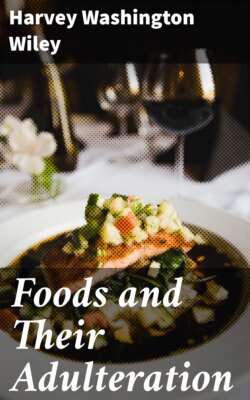Читать книгу Foods and Their Adulteration - Harvey Washington Wiley - Страница 91
На сайте Литреса книга снята с продажи.
Adulteration of Canned Fresh Meat.
Оглавление—Fortunately the process of sterilization is of such a character, when properly carried out, as to exclude all necessity for the addition of any preservative substances to canned fresh meat. The use of ordinary condimental substances in moderate quantities cannot be regarded as an adulteration. Hence, the addition of small quantities of salt, sugar, vinegar, and the ordinary spices, when used solely for the improvement of the taste and flavor and not for preservative purposes, is regarded as unobjectionable.
The common preservatives used in canned meat are, first, those which give color to the meat and preserve its natural red tint. For this purpose saltpeter and sulfite of soda are most commonly employed. Red dyes of any description are rarely, if ever, found. The preservative which is used most frequently in canned meat is borax or boric acid. That this use is not necessary is evident from the investigations which have been made in the Bureau of Chemistry which show that in most cases no preservatives at all are used. The addition of any chemical preservative is, therefore, to be regarded as unnecessary and as an adulteration.
The use of any diseased, tainted, decomposed, or filthy meat, even if it is of the same origin as that in the can, is an adulteration of the most serious character and which can only be effectually controlled by the inspection mentioned above. The adulteration of the meat of fowls of all descriptions by cheaper meats, such as pork or veal, even if they be of wholesome and sound character, is an adulteration said to be often practiced and one which it is difficult to detect if the particles of meat are finely comminuted.
